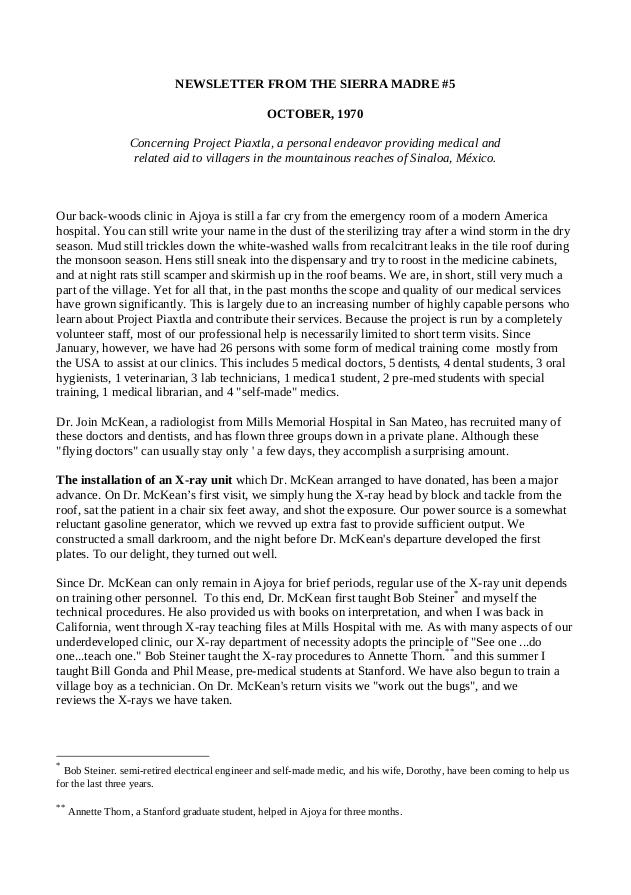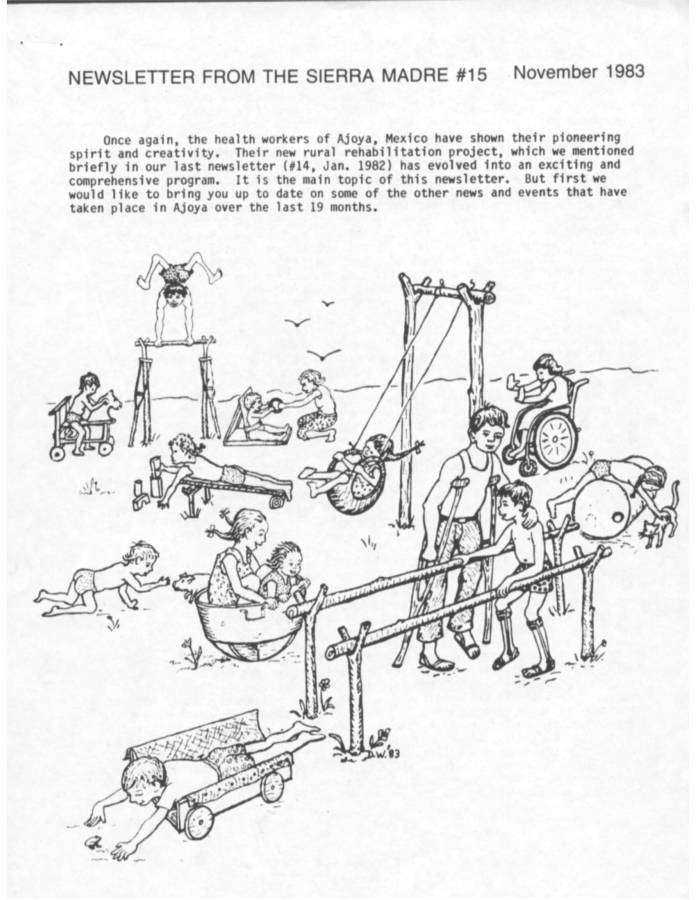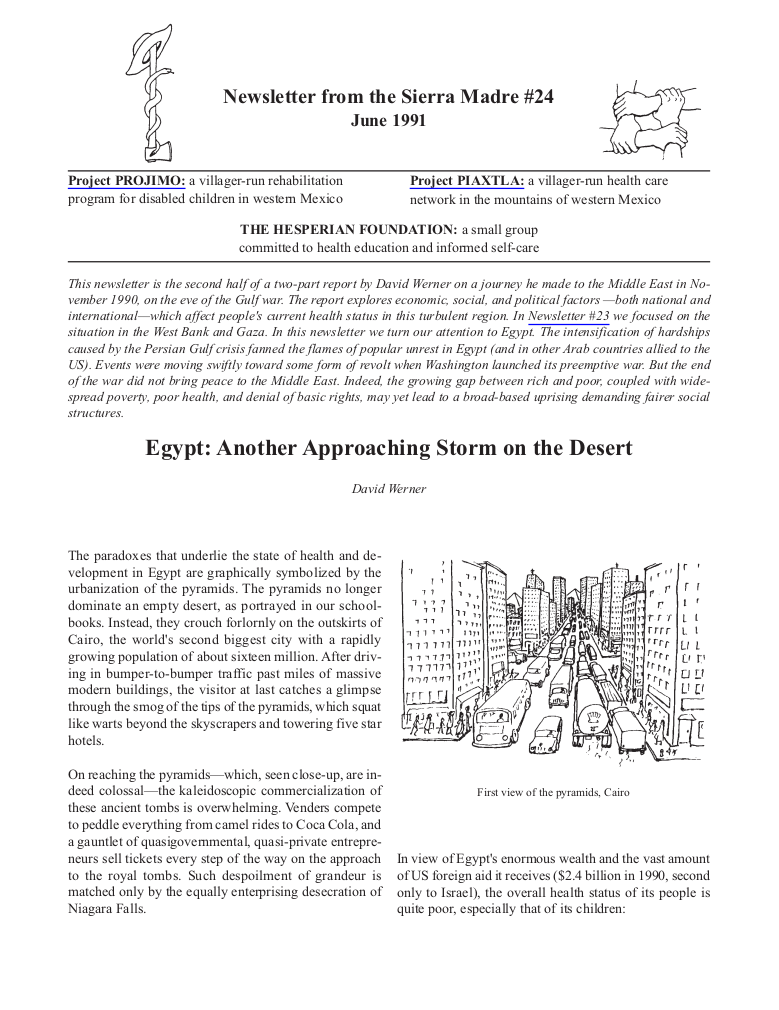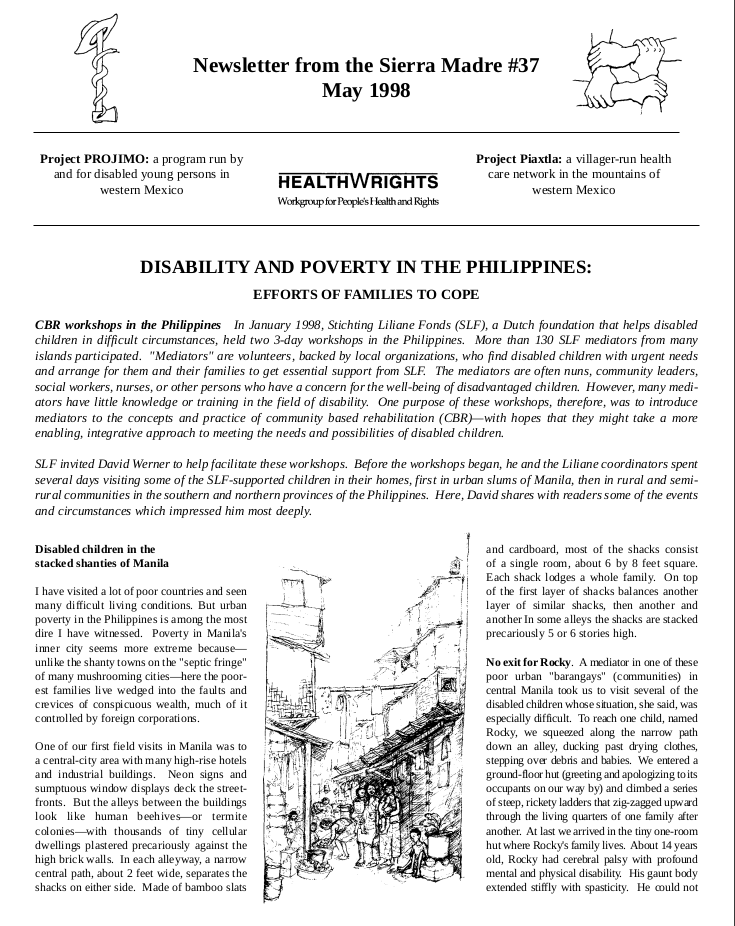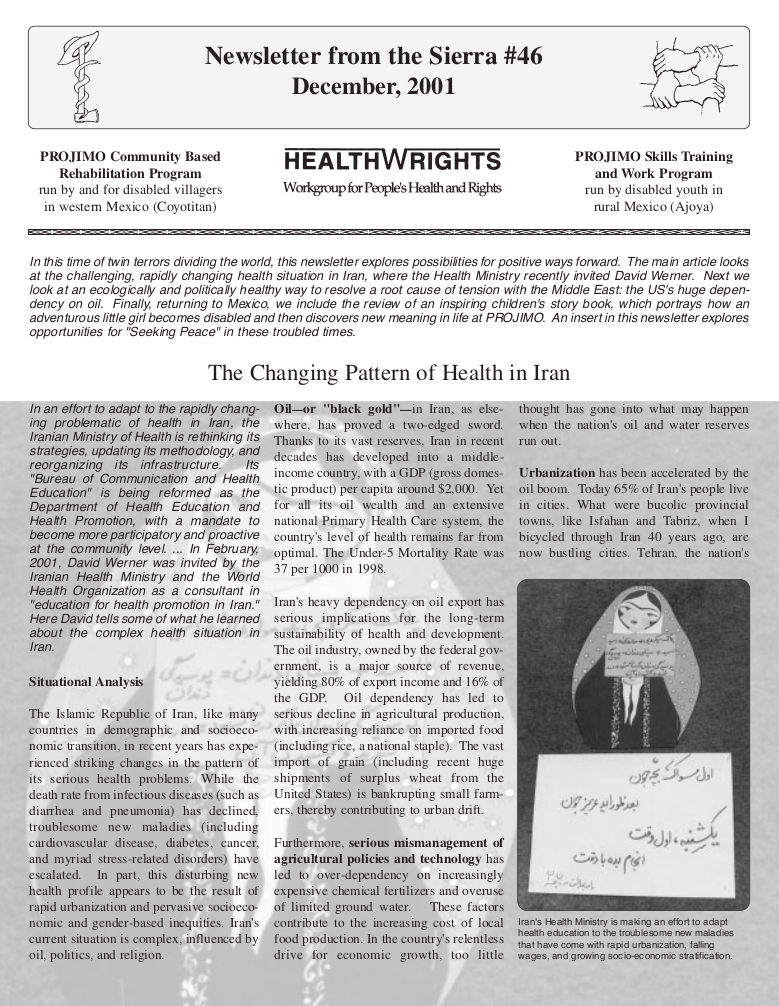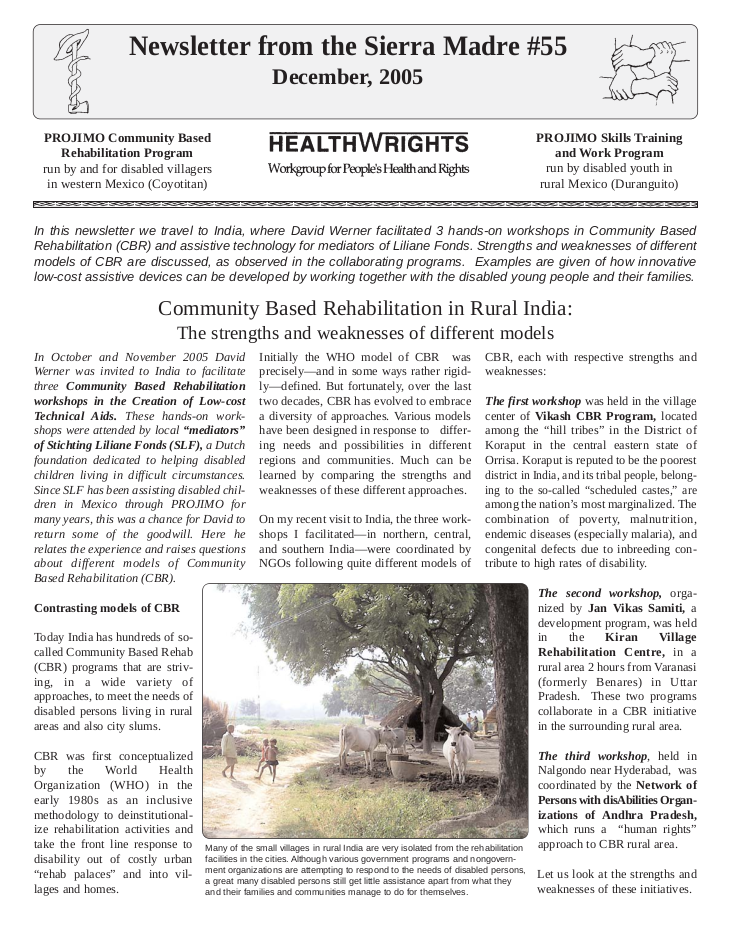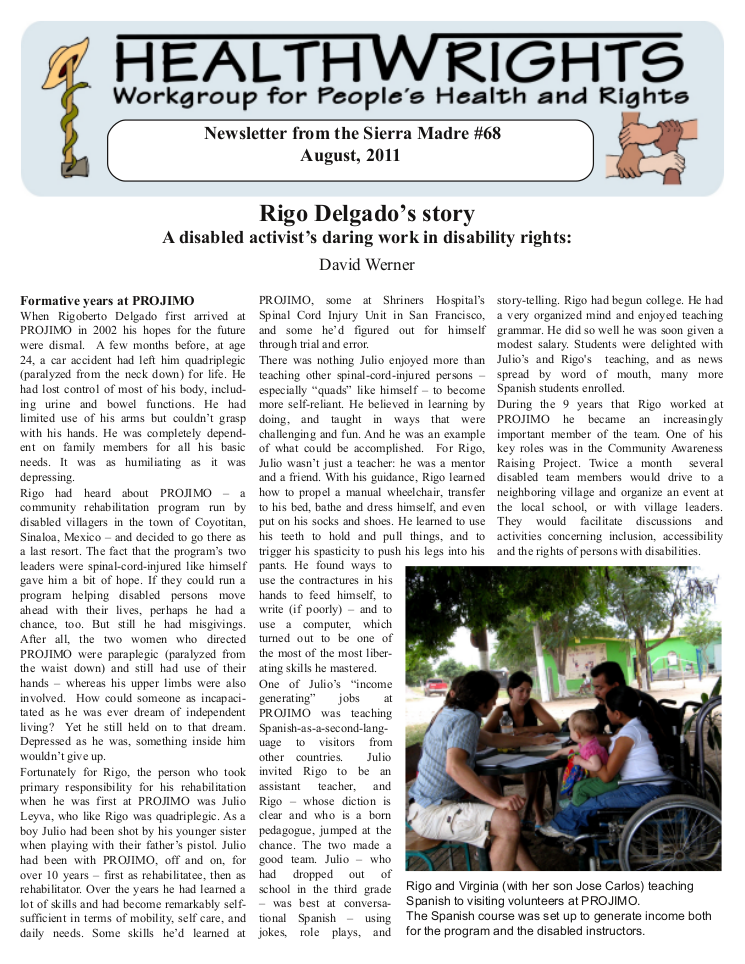Renacimiento del pueblo de Ajoya y su venerada clínica ‘que pone primero al último’ Los lectores que han leídos nuestros boletines durante varios años sabrán algo sobre el programa de salud administrado por los pobladores en la Sierra Madre de México, que durante décadas tuvo su sede en el pintoresco pueblo ribereño de Ajoya. Y sabrán que el pueblo, tanto como su clínica, ha tenido, sus altibajos.
Hacer frente a Covid: la necesidad de igualdad, inclusión y solidaridad global Un promotor de salud de una aldea en la Sierra Madre de México inmuniza a un niño con DPT, una vacuna contra la difteria, la tos ferina y el tétanos.
La pandemia de Covid Este último año, con la desastrosa pandemia de Covid-19, ha sido un desafío en todo el mundo.
Anunciando un nuevo libro de David Werner: Reportes de la Sierra Madre: Historias detrás del manual de salud Donde no hay doctor OJO: Por lo pronto (en 2019) este libro está publicado solamente en inglés. Actualmente lo estamos preparando la edición en español, con esperanza de que salga en el año 2021.
David Werner y HealthWrights (Grupo de trabajo para la Salud y los Derechos del pueblo) anuncian el lanzamiento de este nuevo libro, Reports from the Sierra Madre.
Inclusión de los más excluidos: ‘El poder de las cuerdas’ | Actualización sobre la iniciativa Amigos y Compañeros del Hogar, Ubon, Tailandia por David Werner Traducido por Juan Ignacio Gómez Iruretagoyena, Revisado por Dolores Mesina y Adrián Martínez Lomovskoi. Como se describió en el Boletín nº 81, el programa Salud Compartida (Health and Share) en Ubon fue iniciado originalmente por una organización no gubernamental japonesa llamada SHARE (COMPARTIR).
Mary Picos, la líder de PROJIMO durante 35 años, murió
AVISO: Muy tristemente, hace solo unas semanas (22 de febrero de 2018) Mary Picos, la líder parapléjica dinámica del programa de rehabilitación comunitaria PROJIMO durante 35 años, murió a causa de una septicemia fulminante causada por una llaga infectada. (Para una nota sobre su muerte, haga clic aquí
Drogas y Discapacidad: La Crisis de Drogas en México por David Werner A mediados de la década de 1960, cuando yo comencé a trabajar en los programas de salud comunitaria en la Sierra Madre, cannabis y amapola para obtener el opio ya eran cultivadas por algunos pobladores, en gran parte como cultivos comerciales para abastecer la demanda de consumidores de marihuana y heroína en los Estados Unidos.
PROMOCIÓN DE LA SALUD EN AMBIENTE DE CONTRADICCIONES por David Werner Mi invitación a Tailandia En mayo del 2017 fui invitado por la Fundación Salud y Compartir (HSF, las siglas en inglés) en Tailandia, y su organización madre SHARE (con sede en Japón), para visitar su innovador programa de alcance comunitario en la provincia de Ubon-Rachathani, en la frontera entre Tailandia y Laos.
Tocayos resultantes de ‘Donde no hay doctor’ por David Werner Lo que en vuelta se va, de vuelta regresa resultados inesperados de nuestros libros y actividades parte 3
Desde que escribí e ilustré el libro “Donde no hay doctor” producto de mi experiencia en los rincones de la Sierra Madre Occidental de México hace medio siglo, este el libro ha sido traducido a 100 idiomas, con más de tres millones de copias impresas.
Conexiones fortuitas: Un niño con atrofia muscular CMT, igual que yo por David B Werner Tomás Lopez.
Hace tres años, en 2013, recibí un correo electrónico urgente de una madre en Guadalajara, preguntándome si sabía algo sobre el síndrome de Charcot-Marie-Tooth. Ella me dijo que a su hijo, Tomás, nacido en julio de 2003, le habían diagnosticado “CMT”, una afección neurológica progresiva que comienza en la primera infancia.
Visita a ARSOBO por David B Werner respuestas inesperados de nuestros libros y actividades - parte 2
Proyectos para la inclusión en la frontera de Arizona y Sonora.
Según lo planeado, a mediados de noviembre de 2015, mi gran amigo Polo Ribota y yo partimos en un largo viaje desde Mazatlán, Sinaloa, a Nogales, Sonora, en la frontera de EE.
Lucha por la Salud y los Derechos en el Cono sur de América del Sur: Profesionales de la Salud que Están del Lado de los Desfavorecidos Por David Werner Traducido por Juan Ignacio Gómez Iruretagoyena, revisado por y Adrián Martínez Lomovskoi Introducción En abril de 2014, a mí, David Werner, me pidieron visitar Chile y Argentina, los dos países que flanquean la imponente Cordillera de los Andes en el cono sur de Sudamérica.
‘El Silencio que Grita’: Escritos Sabios de un Niño que no Tuvo Voz Durante 12 Años Por David Werner Primera Asamblea Internacional del Movimiento para la Salud de los Pueblos – América Latina. Cuenca, Ecuador, Octubre de 2013. El Sueño de la Inclusión para Todos Participantes en la Asamblea de Cuenca dirigida por indígenas trabajadores de salud de Guatemala, participan en una ceremonia tradicional de respeto a Pacha Máma, el espíritu de la madre naturaleza de la que todos somos parte.
Timor Oriental: el Desafío para la Salud Humana, Ambiental y Política por David B Werner Traducido por: Juan Ignacio Gómez Iruretagoyena, revisado por Adrián Martínez Lomovskoi. I. Introducción Timor-Leste es la parte oriental de una isla en un archipiélago indonesio.
Cuando me invitaron a Timor-Leste en noviembre pasado para compartir experiencias en Atención Primaria de Salud, aproveché la oportunidad. Durante mucho tiempo he admirado la lucha decidida del pueblo timorense por la liberación contra viento y marea.
Donde No Hay Doctor en Japón por David Werner El Dr. Toru Honda, fundador de SHARE, tiene una copia de la nueva traducción japonesa de Where There Is No Doctor, de David Werner. El libro será utilizado no solo por los trabajadores japoneses de salud y desarrollo en los países pobres, sino también por la creciente población de indigentes y desamparados de Japón, y por las numerosas ONG locales y "clínicas gratuitas" que ofrecen asistencia.
Talleres Para y con Niños Discapacitados en Colombia por David Werner Las dos ciudades en Colombia donde dirigí talleres sobre “Rehabilitación Basada en la Comunidad y Tecnología de Asistencia” son geográfica y climatológicamente muy diferentes. Sin embargo, en términos del vasto y creciente abismo entre ricos y pobres, son terriblemente similares. La primera es la ciudad grande y de rápido crecimiento de Medellín, ubicada a 5000 pies sobre el nivel del mar en un amplio y bucólico valle en los Andes.
Salud en Armonia: Un Programa en Borneo que Enlace a la Comunidad y la Salud Ambiental Por David Werner La Creación del Sueño Paralelismos Curiosos Cuando Kinari Webb, la joven cofundadora norteamericana del programa Health In Harmony en Borneo, visitó por primera vez las selvas tropicales de Kalimantan como estudiante universitaria hace 15 años, llevaba en su mochila una copia del manual de atención médica rural: Donde No Hay Doctor.
‘De Niño a Niño’ con Niños Discapacitados y no Discapacitados en Michoacán, México: Un Esfuerzo Para Hacer que la Escolarización sea más Inclusiva y Empoderadora Por David Werner.
Niño a Niño es un proceso educativo innovador en el que los niños en edad escolar aprenden formas de proteger la salud y el bienestar de otros niños, especialmente aquellos que son más pequeños, más vulnerables o tienen necesidades especiales.
Batalla Cuesta Arriba de Sudafrica for la Equidad y la Salud Un informe de David Werner sobre talleres facilitadores con la Asociación del Cabo Occidental para Personas con Discapacidad, Febrero-Marzo de 2007 Dos Mundos Uno al Lado del Otro A pesar del fin oficial del apartheid en 1994, la nación sigue dividida en dos mundos: los que tienen y los que no tienen.
ConstruyEndo Asociaciones Más Allá de las Fronteras: Empoderando a los Vulnerables por David Werner Conferencia anual de la Asociación de Terapia Ocupacional del estado de Nueva York, 27 de agosto de 2006 En agosto de 2006, David Werner fue invitado a hablar en la Conferencia Anual de la Asociación de Terapia Ocupacional del Estado de Nueva York, celebrada en la sede de las Naciones Unidas en la ciudad de Nueva York.
Headers require attention.
Honduras - Nuevos daños por viejas heridas: La guerra “Contra” respaldada por Estados Unidos contra Nicaragua en los años 80 todavía tiene un alto costo Cuando el huracán Katrina azotó las ciudades costeras de Louisiana y Mississippi en septiembre de 2005, entre los que sufrieron grandes dificultades se encontraban los incontables miles de inmigrantes indigentes e indocumentados de América Latina, especialmente de Honduras.
Hace veinte años David Werner visitó Cuba como parte de la Brigada de Salud California-Cuba. Posteriormente escribió un artículo: “La salud en Cuba hoy: ¿un sistema modelo o un medio de control social, o ambos?” Para este artículo, en el que trató de analizar las fortalezas y debilidades del sistema cubano, fue atacado tanto por cubaófilos como por cubafóbicos. Ahora, después de volver a visitar Cuba en mayo de 2004 para evaluar un proyecto piloto de rehabilitación basada en la comunidad, ofrece una actualización.
Lucha por la justicia social y el comerio justoLucha por la justicia social y el comerio justo por David Werner; escrito en Santa Cruz, Bolivia, October 2003
Elegí el momento equivocado para ir a Bolivia Me invitaron a hablar en La Paz en un seminario nacional sobre Comunicaciones y Discapacidad con enfoque en Derechos Humanos, programado para el 15 y 16 de octubre de 2003.
La vida después de la lesión de las minas terrestres - en Colombia La desigualdad como raíz de la violencia En la hermosa nación ecuatorial de Colombia, la violencia armada se ha convertido cada vez más en una forma de vida, y para muchos, en una forma de muerte o discapacidad. Las diferentes facciones, que compiten por dinero, poder, tráfico de drogas o la redistribución de la tierra y la gobernanza, han estado en la garganta del otro durante décadas.
Malas noticias y buenas noticias desde la Sierra Madre … Primero las malas noticias: La masacre de Ajoya Con vistas al Río Verde en las laderas de la Sierra Madre Occidental de México, el pueblo de Ajoya ha sido durante los últimos 37 años el núcleo de las innovadoras iniciativas comunitarias de salud y rehabilitación, el Proyecto Piaxtla y PROJIMO. Estos programas dieron a luz los manuales: “Donde No Hay Doctor”, “Aprendiendo a Promover la Salud”, “El Niño Campesino Deshabilitado” y “Nada sobre Nosotros sin Nosotros”.
El Patrón Cambiante de la Salud en Irán En un esfuerzo por adaptarse a la problemática de la salud rápidamente cambiante en Irán, el Ministerio de Salud iraní está reconsiderando sus estrategias, actualizando su metodología y reorganizando su infraestructura. Su “Oficina de Comunicación y Educación para la Salud” se está reformando en un Departamento de Educación para la Salud y Promoción de la Salud, con el mandato de ser más participativos y proactivos a nivel comunitario.
Perspectivas para un ‘futuro habitable’: sueño y realidad por David Werner En agosto de 2001, la Fundación Mulago celebró una reunión de líderes de diferentes programas comunitarios de salud y desarrollo que ayuda en diferentes partes del mundo. La reunión tuvo lugar en la campestre sede central de Future Generations (Generaciones Futuras), cerca de Franklin, Virginia Occidental. El propósito del intercambio era ayudar a Mulago y los programas a reexaminar su visión general y considerar estrategias para un cambio inmediato y de gran alcance, en vista de las problemáticas de la época en que lo vivimos.
Something is wrong with this Newsletter.
¿LIBERACIÓN DE QUÉ?: UNA REFLEXIÓN CRÍTICA SOBRE LA ASAMBLEA DE SALUD DE LOS PUEBLOS, 2000 por David Werner y David Sanders Han transcurrido más de tres meses desde el primer evento internacional importante de la Asamblea de la Salud de los Pueblos (PHA) que tuvo lugar en Bangladesh, del 3 al 8 de diciembre de 2000.
ENFERMEDADES GLOBALES Y LUCHA POPULAR EN ECUADOR En septiembre de 2000, David Werner visitó Ecuador para ayudar a facilitar dos actividades muy diferentes. Una fue un Foro regional de tres días para la salud de las personas, celebrado en Cuenca y organizado por el Dr. Arturo Quizhpe y la Facultad de Ciencias Médicas de la Universidad de Cuenca. El otro fue un curso de capacitación regional de seis días, basado en rehabilitación basada en la comunidad, realizado en Quito y organizado por Christoffel-Blindenmission (CBM).
LUCHA POR EL BIENESTAR HUMANO Y AMBIENTAL SOSTENIBLE EN LA COSTA DE OAXACA, MÉXICO por David Werner En mayo de 2000, un grupo de ASHOKA, una fundación caritativa con sede en los Estados Unidos que otorga subsidios a innovadores para el bien común, visitó una serie de proyectos para el desarrollo sostenible en la costa de Oaxaca en el sur de México.
‘Los Chavalitos’: Una Escuela Agrícola única en la Zona Rural de Nicaragua Un Oasis de Aprendizaje en Equilibrio Con la Naturaleza En una zona remota del centro de Nicaragua, en febrero de 1999, David Werner y Martin Reyes tuvieron la oportunidad de visitar una iniciativa extraordinaria llamada LOS CHAVALITOS, también conocida como Granja Escuela. David Werner informa sobre esta sorprendente, idealista, pero muy humana iniciativa.
La historia de Conchita Concepción Lara de Zamora Concepción Lara - Conchita, para abreviar - es miembro del equipo del Proyecto PROJIMO desde hace mucho tiempo. En la reunión de la junta de Hesperian en junio, contó la historia personal que la llevó al proyecto y habló sobre lo que su participación en PROJIMO ha significado para ella. Si bien su historia es exclusivamente suya, en muchos sentidos es típica de las experiencias de otros que vienen a PROJIMO para recibir tratamiento o rehabilitación y terminan permaneciendo como trabajadores.
Informe de Filipinas
Susan Klein
En noviembre de 1986 fui a Nicaragua para asistir al Cuarto Coloquio Anual de Nicaragua / América del Norte sobre Salud. Había estado trabajando para Hesperian en un manual sobre partería para su uso en el Tercer Mundo, y fui al coloquio para conocer gente, especialmente parteras tradicionales y trabajadores de salud comunitarios, para aprender un poco más sobre la situación nicaragüense y dar una presentación sobre educación para el parto.
Marcelo y Luis por Oliver Bock Marcelo se siente atrapado. Una vez más no sabe qué hacer. Está seguro de que se está jugando una broma sobre él y está confundido. Al carecer de las herramientas para comprender, Marcelo recurre a su probada y verdadera respuesta. “No me mires”. Él exige. Y, con un rápido movimiento de cabeza lejos del insulto, se aleja, buscando una empresa más hospitalaria.
[/THUMBNAIL
LA FUNDACIÓN HESPERIAN: un pequeño grupo comprometido con los derechos de salud y el autocuidado informado
EL BULLDOZER AMARILLO o ALGUNAS COSAS BUENAS ESTÁN SUCEDIENDO EN SUDÁFRICA por David Werner Mientras me preparaba para partir de Sudáfrica, un niño de cinco años, angloindio de nacimiento pero genéricamente ‘Negro’ según las reglas del apartheid, el hijo de mis anfitriones en Johannesburgo, presionó un folleto grande, delgado y de colores brillantes en mis manos.
DE ÁRBOLES DE SANGRE AL TRÁFICO DE DROGAS por David Werner Entre los temas que más preocupan a Occidente, y especialmente a los Estados Unidos, están el tráfico internacional de drogas y la deuda del tercer mundo. El vínculo entre los dos a menudo se pierde. Ambos involucran corrupción, pero hay mucho más en la relación que eso.
- Olusegun Obasanjo, ex presidente de Nigeria
[/THUMBNAIL]
Lupe, el gato montés Story by Molly Bang Based on real-life experiences at PROJIMO Lupe era una niña salvaje. Sus dos hermanos, Paulo y Jorge, eran casi tan salvajes como ella.
Todos nadaban en los pozos de agua más profundos. Nadaban cuando el río corría alto. Una vez Paulo fue barrido una milla río abajo antes de que fuera retenido por un árbol medio sumergido en el agua y pudiera salir.
MARI por Bruce Curtis NOTA DEL EDITOR: Bruce Curtis es un cuadripléjico usuario de silla de ruedas que durante años ha trabajado como organizador, defensor y consejero para personas discapacitadas, tanto en los Estados Unidos como en el extranjero. Su experiencia en el asesoramiento a grupos locales de personas discapacitadas en México y Centroamérica lo convierte en un invitado valioso en el Proyecto PROJIMO.
Note to translator: please translate this Newsletter.
NL15 Sp – Técnicas e y equipos de rehabilitación de los niños con discapacidad en el area rural
En inglés se encuentra en linea a Newsletter #15.
Este boletín reproduce un folleto sobre rehabilitación en la comunidad (RBC) – actividades, ayudas técnicas, y rehabilitación para los niños con discapacidad en el area rural, usando materiales y objectos locales a bajo costo.
MUJERES UNIDAS PARA VENCER LA BORRACHERA La noticia de que le habían disparado llegó al pueblo de Ajoya solo unos minutos antes que los que traian de la camilla. La gente decía que se estaba muriendo, que su esposo le disparó en la espalda.
Unos minutos más tarde, una multitud de hombres, mujeres y niños, gritando y llorando, entraron en la vieja clínica de adobe.
An Update on Project Piaxtla’s Growing Self-Sufficiency El Proyecto Piaxtla está vivo y activo. La Fundación Hesperian está hasta las cachas con el trabajo, algunos de ellos rutinarios, muchos nuevos y emocionantes. Ha pasado mucho tiempo desde que salió el último boletín pero no es porque haya sucedido poco, sino demasiado.
El programa de salud dirigido por los campesinos en las montañas de México (Proyecto Piaxtla) se ha vuelto cada vez más independiente de la Fundación Hesperian y otros apoyos externos.
Queridos amigos,
Durante el año pasado, el equipo de salud de la aldea de Ajoya ha dado grandes pasos hacia la autosuficiencia. Hoy todo el programa, que consiste en el centro de referencia y capacitación en Ajoya y una decena de puestos de salud en ranchos y aldeas periféricas, está completamente dirigido y administrado por campesinos. Ya no hay estadounidenses u otros “forasteros” que participen continuamente en el programa en curso.
EL PROYECTO DE SALUD “PIAXTLA” – LA HISTORIA DE VICTOR by David Werner Estimados amigos del Proyecto Piaxtla,
El contenido de este boletín ha sido preparado por Victor Miller, un californiano de 28 años que, como voluntario del Proyecto Piaxtla, pasó los últimos dos años en el interior de la Sierra Madre ayudando a los campesinos a establecer sus propias “clínicas” o puestos de salud, y en la formación de los promotores de salud para que se hagan cargo de ellas.
[TRANSLATOR]Juan Ignacio Gómez Iruretagoyena[/TRANSLATOR]
Estimados amigos del Proyecto Piaxtla,
Les pido su comprensión.
Es cierto que este boletín es demasiado largo, en gran parte por la historia de María, cuyas circunstancias de los últimos días y momentos me han carcomido, y de la que tengo que salir. Podría haber dividido el boletín, pero creo que la primera parte ayuda a preparar el escenario para la contabilidad principal.
Estimados amigos del Proyecto Piaxtla,
Al leer este boletín, es posible que se pregunte por qué hablo tanto sobre las mulas. Sin embargo, recuerde la importancia única de estos animales de patas seguras para la prestación de servicios de salud en zonas montañosas sin caminos donde la ambulancia sigue siendo tan fabulosa como el unicornio. Recuerde también que aquí en las barrancas lo que a menudo es más crucial para la supervivencia del paciente no es un gran conocimiento médico, ni un amplio espectro de medicamentos, sino el llegar a tiempo a donde se necesita.
Preface and Project Piaxtla Updates by David Werner La participación del Dr. Kent Benedict, pediatra de California, en la Clínica de Ajoya durante la mayor parte del último año y medio ha sido de gran ayuda. Los aldeanos no solo han recibido mejor atención médica que nunca, sino que todos los aficionados que hemos tenido la oportunidad de trabajar con Kent hemos aprendido mucho de él sobre la práctica de la medicina, ya que Kent no solo es un practicante de primer nivel, es un maestro inspirador.
[SUBTITLE]LA INUNDACIÓN FATAL EN LA TAHONA; JUAN EL ARTISANO;
REFLECCIONES SOBRE AMOR Y CARIDAD[/SUBTITLE]
¡Fíjese!
Que no la fijaba nada,
Ni me levantaba los ojos
Y allí estaba, al oscurecer
Sonriendo tranquilamente por abajo
Sin agitarse:
La luna, casi llena.
Imagine!
I had not even noticed her,
Had not even looked up
And there she was, at dusk
Smiling quietly down
[DELETE]OLD SUBTITLE: An X-ray machine and A Portable Dental Drill for the clinic, Making Dentures, and New Clinics Opening[/DELETE]
Updates on the Ajoya Clinic Nuestra clínica en el bosque en Ajoya todavía está muy lejos de la sala de emergencias de un hospital moderno. Aún puede escribir su nombre en el polvo de la bandeja esterilizadora después de una tormenta de viento en la estación seca.
Not to translator: What are these headings?
PROMOCIÓN DE SALUD EN PROYECTO PIAXTLA:
NUEVA VIDA POR CIRUGÍA CARDÍACA: EL NIÑO MANUEL
PERSONAL MÉDICO VOLUNTARIO
EL PROGRAMA DENTAL
PROBLEMAS ECOLÓGICOS EN LAS BARRANCAS
EXPERIMENTO CON MAÍZ ALTO EN PROTEÍNA (UN FRACASO)
TODO LO QUE SE HIZO FUE DE CORAZÓN Después de la boda y el banquete de bodas, todo el pueblo, desde los jóvenes tambaleantes hasta los viejos tambaleantes, acudió al baile de bodas.
[TRANSLATOR]Juan Ignacio Gómez Iruretagoyena[/TRANSLATOR]
EL HURACÁN A finales de agosto había una nueva esperanza en las barrancas de la Sierra Madre. Las fuertes tormentas habían sido más ligeras de lo habitual durante los monzones de verano, y rara vez el río había salido de sus orillas. Sin embargo, las lluvias, aunque suaves, habían sido persistentes y los campesinos habían comenzado a regocijarse ante las perspectivas de una cosecha abundante de maíz.
Notice: This Newsletter is Missing From the Collection This Newsletter is missing from the collection. If you have this Newsletter, please send an email to info@healthwrights.org.
WHAT IS THIS?
Hola Genaro,
Saludos de Palo Alto, California. Espero que todo pasa bien contigo y con todas las actividades tan bonitas en Ajoya.
Rigo me mandó una nota diciendo que había comunicado contigo,sobre los problemas médicos de la esposa de su hermano (cancer del pecho) y de recién nacido de ella misma (hipoxia al nacer con posible daño celebra) y de la grande deuda hospitalria que se ha ido acumulando.
[TRANSLATOR]Juan Ignacio Gómez Iruretagoyena[/TRANSLATOR]
DESARROLLO DE PROYECTO PIAXTLA;
CUESTIONES DE PODER Y DEL HAMBRE
INTRODUCCIÓN DE AGUA POTABLE EN AJOYA;
CIRUGÍA RECONSTRUCTIVA
The Political Origins of the Project Piaxtla Corn Bank Cuando llegué por primera vez a las barrancas, no tenía ninguna intención de participar en asuntos políticos o involucrarme en ningún problema del pueblo que no fueran los estrictamente médicos.
EL SEGUNDO AÑO DE EL PROYECTO PIAXTLA por David Werner La serie de informes titulada “Reportes de la Sierra Madre” terminó con el No. 4 en 1976. Sin embargo, muchos suscriptores han mostrado tanto interés en mi continuación con Proyecto Piaxtla en Mexico rural que me gustaría mantenerles informados – aunque sea en forma más breve – de mis actividades en las barrancas desde que se publicó el último informe en febrero.
1/2
»



